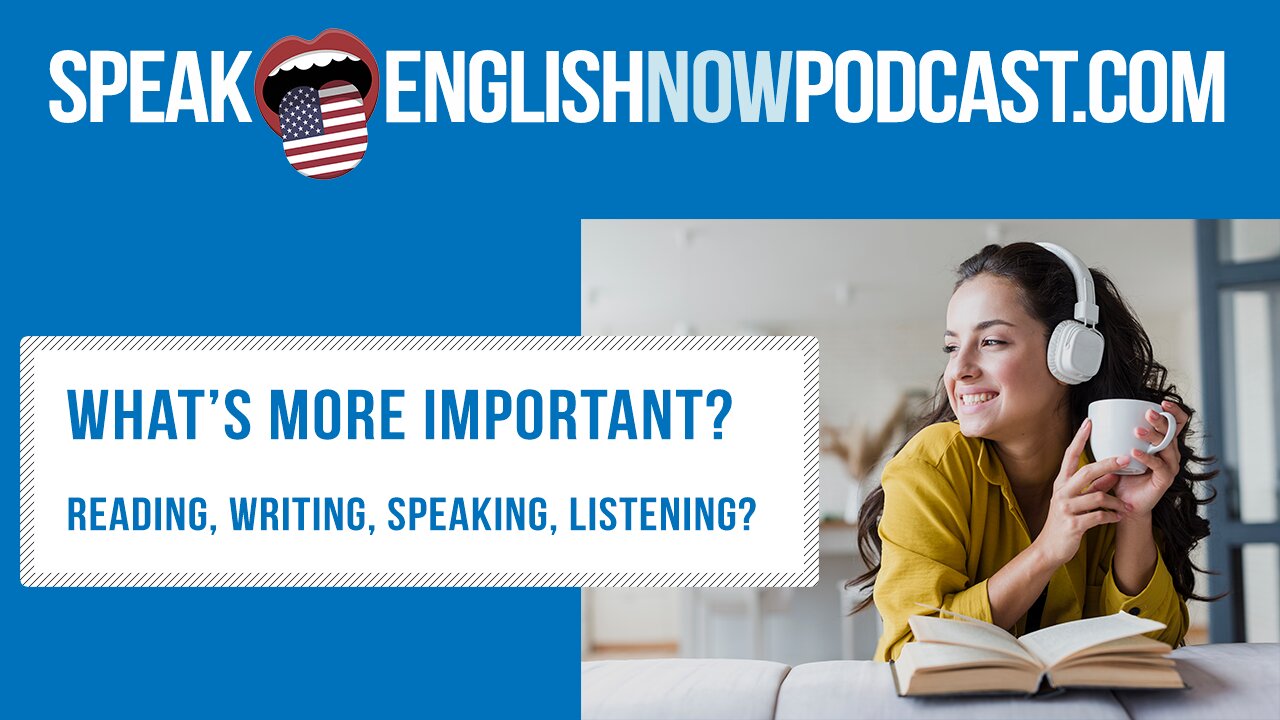Premium Only Content

#135 Reading, Writing, Speaking, or Listening in English? (rep)
#135 Reading, Writing, Speaking, or Listening in English? (rep)
READ the TEXT here: https://SpeakEnglishpodcast.com
Listen to a new episode of Speak English Podcast, your favorite material for practicing your spoken and heard English. You will also learn about lifestyle and culture, language, vocabulary, and how to improve your English more effectively.
Transcript:
Hello, everybody! I am Georgiana founder of SpeakEnglishPodcast.com. My mission is to help you to speak English fluently.
In this episode, I’m going to talk about the relationship between reading, writing, speaking, and listening. After that, I’m going to tell you a Point of View Story.
Ok, let’s get started!
As a language student, the main activities to learn a new language are: reading, writing, listening, and speaking. This is what we naturally do in our mother tongue.
One key aspect to keep in mind is that we can categorize these activities as input and output. As you may guess, listening and reading are input activities, and writing and speaking are output activities.
In other words, when you’re listening or reading, you are being exposed to the language, and when you’re writing and speaking, you are “producing” the language.
The traditional approach tells you that the more you write and speak, the better. That’s why language schools insist on writing a lot and “practicing” your speaking with other students, sometimes in groups.
This seems reasonable, but it’s not effective. There’s a lot of research that points out the contrary: Basically, to develop your English, you need to do input activities most of the time.
Why is that? Because you can’t produce the language if you haven’t previously learned it, and the only way to learn it is through comprehensible input, as simple as that.
But then…is speaking and writing a waste of time? No, I didn’t say that.
When you speak in a conversation, you can see what areas of the language you need to improve. Then, when you listen again, you will naturally pay more attention to those areas. For example, if you’re in a conversation, and you have to describe something in the past tense. When you try to do it, you see that you make some mistakes. The next day, when you listen to your materials again, I bet you’ll pay more attention to the past.
A good schedule may be listening for one hour a day (a course, a podcast, etc.) and practicing your speaking with a tutor or friend a couple of times a week. You will improve a lot.
Last but not least, there’s an interesting consequence when you listen and when you read:
Listening will naturally help you with your speaking.
Reading will naturally help you with your writing.
Speak English Now Podcast with Georgiana
#135 Reading, Writing, Speaking, or Listening in English? (rep)
READ the TEXT here: https://SpeakEnglishpodcast.com
-
 11:30
11:30
Speak English podcast with teacher Georgiana
1 year ago244 The court of Law in the USA —Part 1
179 -
 8:56
8:56
Speak English podcast with teacher Georgiana
3 years ago#137 How to make listening in English fun (rep)
96 -
 2:17
2:17
WMAR
3 years agoFrom reading scripts to writing a novel
42 -
 8:51
8:51
Douglas_Vieira
3 years agoSpeaking English after 7 years studying through reading
613 -
 26:48
26:48
Stephen Gardner
8 hours ago🔥BREAKING: Vladimir Putin JUST shocked NATO | Will only negotiate with Trump!
106K148 -
 2:45:39
2:45:39
Tundra Tactical
11 hours ago $27.76 earnedTundra Nation Live : The Worlds Okayest Gun Live Stream
52.9K1 -
 17:06
17:06
Professor Nez
9 hours ago🚨BREAKING: Elon Musk to BUY MSNBC!? Dems STUNNED by Brian Williams’ Viral Video!
46.1K55 -
![If You Smell LALALALA What CHiLi IS COOKING!!... #RUMBLETAKEOVER [Overwatch 2]](https://1a-1791.com/video/s8/1/e/s/X/3/esX3u.0kob-small-If-You-Smell-LALALALA-What-.jpg) 4:27:40
4:27:40
CHiLi XDD
11 hours agoIf You Smell LALALALA What CHiLi IS COOKING!!... #RUMBLETAKEOVER [Overwatch 2]
27.9K1 -
 LIVE
LIVE
Delnorin Games
11 hours ago🔴 Live - Star Citizen
1,966 watching -
 1:39:44
1:39:44
HELMET FIRE
13 hours agoDEADROP IS BACK!
143K8